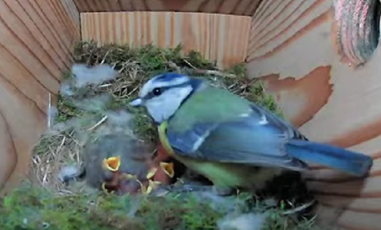
Bird Camera
We are very excited to be able to share the link for our bird camera. So far, we have been able to watch Betty the Blue Tit’s eggs hatch and their first feed. Looking at the footage we think there are 7 baby chicks in the nest. The eggs hatched on 9 May, and blue tits will fledge the nest around 18 to 21 days after hatching, so we are expecting the chicks to start fledging from the 27 May, however they may be a bit earlier. Keep checking out the live stream to not miss out. We will keep updating X (@SouthHunsleyEco) with important changes.

Spring Gardening
It is getting to that time when we are wanting to start planting out flowers to make the gardens look pretty. A few weeks ago, we planted some pots with geraniums and dahlias and placed them around the Kingston pond, these flowers will help to attract bees and butterflies to the area, which increases the biodiversity. Biodiversity and school grounds are topics that we have chosen to focus on this year for our Green Flag award, and this planting helps both. Gardens are excellent places for increasing biodiversity as they provide green corridors and sections of habitats that contain the environments and food for insects, especially bees and butterflies. Even if you do not have a large garden, you can plant containers on patios or windowsills. Species that are bee and butterfly friendly include alliums, buddleias, lavender, marigolds, peonies, sunflowers and roses. Bees love blue and purple plants, so look out for these colours when choosing plants.
You may be thinking, why do we need to help bees? Bees are currently under threat by humans due to urbanisation, chemical uses that leaks into their food supply, and habitat destruction. Bees pollinate 90% of our food worldwide, so they are very important to us, meaning that we need to try and help them increase in population. Most people are planting flowers anyway, so it would just make sense to ensure we are planting bee friendly flowers.

